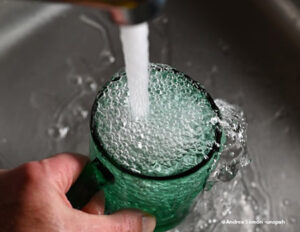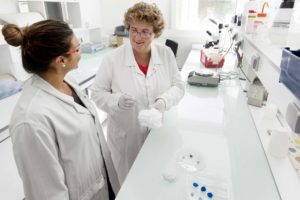 As the global demand for effective water treatment systems grows, particularly in regions where access to clean drinking water is scarce, the development of innovative filtration technologies has become a focus.
As the global demand for effective water treatment systems grows, particularly in regions where access to clean drinking water is scarce, the development of innovative filtration technologies has become a focus.
In a recent study titled “Removal of MS2 and fr Bacteriophages Using MgAl₂O₄-Modified, Al₂O₃-Stabilized Porous Ceramic Granules for Drinking Water Treatment”, researchers investigated the effectiveness of an advanced composite-based filtration membrane.
This ceramic membrane, made from alumina (Al₂O₃) and Baikowski® magnesium aluminate spinel (MgAl₂O₄), demonstrates potential for removing viruses, such as bacteriophages and other microorganisms that contribute to waterborne diseases.
Combatting Waterbone Pathogens with Spinel-based Composite Membranes
The membrane is fabricated by integrating spinel granules into an alumina matrix. This composite approach leverages the mechanical strength of alumina, and the filtration capabilities of spinel due to its fine pore structure and stability.
The Baikowski® product used S25CR is a high-purity jet-milled spinel powder (dv50 = 0.25 µm and surface area of 21–24 m²/g).
This combination of materials allows the membrane to maintain its performance even in extreme environmental conditions.
Baikowski® Spinel Powder Benefits for advanced filtration applications
 At Baikowski®, spinel powders are designed to achieve the highest standards in ceramic applications. Here’s how our S25CR product align with the demand of advanced filtration systems:
At Baikowski®, spinel powders are designed to achieve the highest standards in ceramic applications. Here’s how our S25CR product align with the demand of advanced filtration systems:
- Particle Size and size distribution: Our jet-milled spinel powder offer fine particle size and controlled particle size distribution around 0.25 µm that enable precise tailoring of membrane porosity.
- High Purity Levels: With over 99% phase purity, our spinel powder minimizes impurities that can interfere with membrane performance. This purity is essential in preventing contamination, which can degrade the efficacy of filtration in sensitive applications like water filtration.
Post-Filtration Characterization and Thermal Regeneration
A critical part of the study involved characterizing the materials after filtration to assess the durability and stability of the membrane. X-ray diffraction analysis confirmed that the phase composition of the spinel granules was preserved after exposure to 2 liters of contaminated water, indicating the membrane’s robustness. Electron microscopy further demonstrated that the granular structure remained intact, ensuring the membrane’s continued effectiveness even after prolonged use.
Additionally, the study measured the release of aluminum and magnesium into the permeate after filtration. No aluminum was detected, and the magnesium levels were significantly below the WHO’s recommended threshold for drinking water. This low level of magnesium release is a notable benefit, as excessive magnesium in water contributes to hardness.
One of the standout features of the spinel-based filtration system is its potential for thermal regeneration. When the membrane’s pores become clogged with contaminants, heat treatment at 400°C can restore its filtration capacity. This ability to regenerate the membrane extends its lifespan and makes it a more sustainable solution for water treatment.
Product Customization
 In conclusion, spinel-based composite membranes offer a solution for filtering viruses and other microorganisms from drinking water, with the added benefit of being durable and regenerable. The Baikowski®’s high-purity spinel powder, S25CR, play a role in these advanced filtration technologies, ensuring both high filtration efficiency and long-term stability.
In conclusion, spinel-based composite membranes offer a solution for filtering viruses and other microorganisms from drinking water, with the added benefit of being durable and regenerable. The Baikowski®’s high-purity spinel powder, S25CR, play a role in these advanced filtration technologies, ensuring both high filtration efficiency and long-term stability.
For more detailed insights, you can explore the full study here.
At Baikowski®, our R&D teams customize solutions, such as adjusting the dopant or the particle size, to meet your specifications. We work closely together to develop products that push the boundaries of your application needs. Any questions? Contact-us
